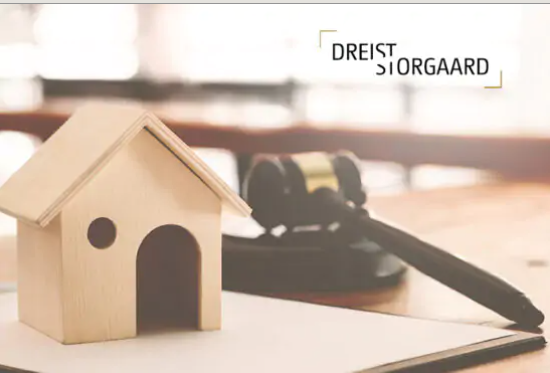What conditions should you be aware of if you want to buy real estate at foreclosure?
What is a foreclosure?
A forced auction is a forced sale of e.g. an immovable property, but also movable property can be subject to being sold at forced auction. An immovable property can be requested via the Bailiff’s Court to be sold at a forced auction if the owner does not pay his debt and the creditor has security for the monetary claim in the property.
The current situation in Denmark
New figures for October from Statistics Denmark show that the number of forced auctions is still low, but there has been an increase in recent months. The expectations for next year are that the increase will continue and that more properties will be foreclosed on. The high level of interest means that many families experience financial challenges, and therefore do not have the finances to sit in their home.
If you are therefore considering whether to buy a property at foreclosure, there are a number of factors that you must be aware of. You can often make a good deal, but it is not risk-free, and there can be challenges that arise in connection with buying at foreclosure.
Compulsory auctions are advertised in the Statstidende, and typically also on several housing portals, e.g. foreclosures.dk and boligsiden.dk.
General conditions that you must be aware of
Preparation is the most important element in the process of buying real estate. It is important that before bidding on the property, you have seen it and familiarized yourself thoroughly with the special conditions that apply to this particular property. The most important information about the property can be found in the sales listing.
In general, you must be aware of the property’s condition, rights/obligations that fall on the property, special auction conditions and costs.
The property is purchased as occupied, i.e. that it is not possible to take out a change of ownership insurance, just as it is not possible to make a claim for errors and omissions against the previous owner. It is therefore always a good idea to inspect the property before the auction.
Furthermore, be aware that the property has special obligations in relation to leases, possibly old tenant requirements, registered easements, local plan etc., which have an impact on the use of the property.
Regarding the bid, it is not the only amount that must be paid. In addition to the bid, the auction buyer must pay the largest amount, which constitutes the preferential claims, e.g. property taxes and court costs. In addition, the buyer must pay an auction fee of DKK 1,500 and the costs of land registration. Finally, the auction buyer may have to pay any frozen ground debt.
When the bid has been given, and has been accepted as being the highest bid, you must provide security for your bid. In practical terms, this means that if your bid is the highest, you must be able to provide security to the bailiff that you can pay the entire purchase price. This can be done by submitting a written declaration from a lawyer or by a bank guarantee. Furthermore, you should also know that your bid is binding for 6 weeks, even if a new auction is requested.
The owner or a mortgagee who does not obtain full coverage can request a new auction in the hope that a higher bid will be received. A 3rd auction cannot be requested, and at a new auction the hammer will be announced to the highest bidder.
As an auction buyer, you get possession of the property when the bailiff has received the entire security for the fulfillment of the conditions. This can advantageously be done with a lawyer’s declaration. In addition, as an auction buyer, you yourself must pay the creditors who have a claim according to the auction and get the auction deed registered on the property.
Counseling
If the preparatory work is done well, then it can be advantageous to buy real estate at a foreclosure. At DreistStorgaard, our lawyers have the skills to help you with the legwork and advise you on the purchase of a property at foreclosure. If you therefore need our help, do not hesitate to contact us on phone 56 63 44 66 or send an email to kontakt@dslaw.dk
By lawyer Katja Skovlund Jensen






